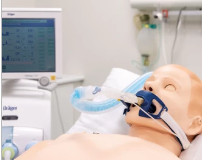UFSC coordinates development of emergency medical equipment
The Universidade Federal de Santa Catarina (UFSC) is leading a network of more than 100 researchers who are adapting or producing ventilators, as well as protective equipment for healthcare workers, to face the new Coronavirus (COVID-19) pandemic. “Since the whole world is facing this problem, no one is willing to export any equipment”, says Thiago Holtgebaum, a Mechanical Engineering graduate who coordinates the Mechanical Ventilators run by the Emergency Medical Equipment (EME) group.
 The first prototype is almost finished due to the efforts of students, faculty, technical administrative staff, physicians and many other professionals. “This project integrates the expertise of many researchers, applying Engineering knowledge with efficiency and simplicity to meet an urgent need for complex equipment”, explains Professor Henrique Simas, a faculty member of the Department of Mechanical Engineering (EMC) who joins the team.
The first prototype is almost finished due to the efforts of students, faculty, technical administrative staff, physicians and many other professionals. “This project integrates the expertise of many researchers, applying Engineering knowledge with efficiency and simplicity to meet an urgent need for complex equipment”, explains Professor Henrique Simas, a faculty member of the Department of Mechanical Engineering (EMC) who joins the team.
The Mechanical Ventilators project has several actions in progress. The most advanced one intends to automatize bag valve masks using a simple concept, which utilizes hospital components that are well known in the market. The team used the ventilator model developed by the Universidade de São Paulo (USP) as a basis and is replicating it to perform the initial tests, in parallel to conducting research with the ‘UFSC Concept’. “We want the model to work and fulfil its role as a ventilator system, without the costs of a more complex equipment”, highlights Thiago, who is currently pursuing a doctoral degree in the UFSC Mechanical Engineering Graduate Program (Posmec).
A second action aims to create a more complex ventilator, able to control different variables, but still using national items already available, meeting the Brazilian Health Regulatory Agency (Anvisa)’s requirements. This project has two work fronts. One of them works with a purely mechanical concept and aims to improve the use of mini ventilators (used in ambulances, for instance). The other one is based on a microprocessed concept and aims to develop a ventilator as similar as possible to the one currently found in the market.
EME also produces – usually with a 3D printer – protective accessories, such as nose and mouth masks and face shields. The group is led by professors Daniel Martins (coordinator), Carlos Rodrigo de Mello Roesler (deputy coordinator) and Humberto Reder Cazangi (operational coordinator). In addition to them, many other UFSC professors and students are part of the group, including Guilherme Pagatini, who currently lives in Italy.
Among the scarce financial resources available, there are R$ 13,000 donated by the UFSC Faculty Association (Apufsc) to buy components for the development of ventilators and material (filament) to produce masks.
Equally dedicated to research and fundraising activities, Polo (Research Laboratories for Emerging Technologies in Cooling and Thermophysics), supported by the Stemmer Foundation for Research, Development and Innovation (Feesc), has opened a bank account to receive donations from individuals or corporations to fight the COVID-19 pandemic. Donations of any value are welcome!
Bank: Banco do Brasil
Branch: 3582-3
Account: 203.013-6
Name: Fundação de Ensino e Engenharia de Santa Catarina
CNPJ: 82.895.327/0001-33
By Heloisa Dallanhol – EMC/UFSC | Translated by SINTER
Read the original article here.





